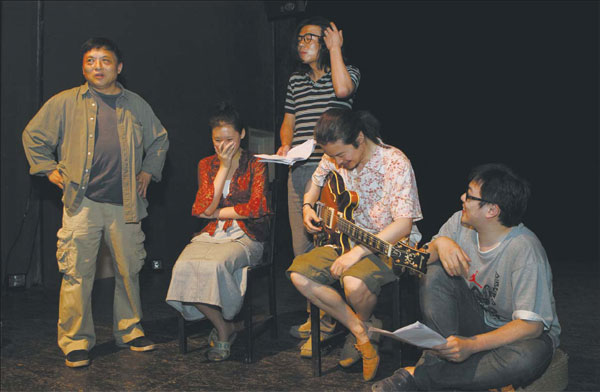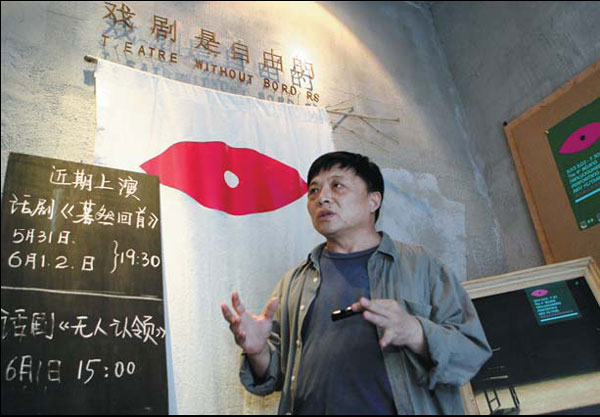Drama for the people
Updated: 2013-06-28 08:09
By Chen Yingqun (China Daily)
|
|||||||||||
|
Wang with performers during a rehearsal of a new play. Zhu Xingxin / China Daily |
Dentist in the morning, theater-owner in the afternoon, Wang Xiang has sunk a small fortune into his dream - bringing quality plays to the public
Wearing a fading blue shirt and old gray trousers and sipping a cup of tea, seemingly without a care in the world, you would hardly guess that Wang Xiang is doing it tough. So tough that his business has lost more than 3 million yuan ($490,000; 375,000 euros) over the past five years. But that is of little consequence to Wang, because his business, Penghao Theater, the first private theater in Beijing, is much more a passion than a commercial venture. A lover of theater for many years, Wang's dream is to stage great drama that is affordable to ordinary people.
The money Wang pours into the theater comes from his other job, as a dentist. Wang was a pioneer of private dental clinics in Beijing and among the first dentists to offer tooth implants in China. He now has four dental clinics in Beijing.
They essentially pay for his 86-seat theater, which cost him 1.2 million yuan to launch in Beijing's Dongcheng District in 2008 and has eaten up more of his income every year since.
"Penghao means ordinary people in Chinese," he says, sitting in the theatre's cafe, amid walls hung with colorful photos from a drama festival currently running in the building.
"I want to make it possible for more ordinary people to go to the theater and enjoy the charm of drama."
Wang's love affair with the theater began in 1985 when he saw a play called He Shi Bi Jade in Beijing. In the play many people give the emperor of China fake jade, so when one man named Bian gives him the real thing he takes it to be fake and orders that Bian's legs be cut off as punishment for attempting to cheat him. Bian tries to drive his apprentice away in order to save him, but the apprentice refuses to leave and cries, 'Don't drive me away, I love real jade'.
Three decades later, Wang still recalls the director's explanation of the play: "Life is precious and even formidable, but what is more precious and formidable than life is the thrilling pleasant surprises of life, the enthusiasm about dreams, the admiration and yearning for kindness and beauty, and the attention of strangers."
Wang views himself as rather similar to Bian, like him offering the real thing but suffering as a result.
Since watching He Shi Bi Jade Wang has immersed himself in theater, making friends with performers and writers, and spending his spare time watching plays. He has seen one play, Copenhagen, 44 times and once invited 60 friends to the theater with him.
"Drama is like a necklace that connects the most beautiful pearls in life, such as wisdom, will and intelligence, and presents them in front of you in a concentrated time," he says.
But in Beijing, he believes that necklace is broken and disappointing, with ticket prices too high for ordinary people to afford (ranging from hundreds to thousands of yuan) and plays too commercialized.
"Even if one can afford the price, it is difficult to watch good drama that can touch your heart, as the directors and play writers have to follow commercial rules and cater to public taste, which usually makes the drama shallow and blundering."
Wang visits theaters wherever he goes and was inspired to launch Penghao after seeing a culture of small private theaters in Europe and the US.
"In the West, small theaters are an important part of the city culture. Whether in New York, Paris or London, there are hundreds of small private theaters, which provide stage opportunities for many young play writers and good plays that don't follow commercial rules. I want to bring this kind of opportunity to China."
There are still fewer than 10 private theaters in Beijing, just one in Shanghai and none in other cities, he says.
His has staged more than 150 plays with about 1,600 performances, of which a fifth were in English. It has also hosted six drama festivals and brought plays from overseas to China.
"We accept all creative forms of art that have rich literary and aesthetic connotations and reflect rational thinking. Also, they have to be vivid, not dull."
Tong Daoming, a theater critic, says he was unable to find a venue that would stage two of his own plays for almost a decade, until he met Wang.
"Most theaters in China are very commercial. I wouldn't expect them to accept my plays," he says. "Penghao's slogan is to pursue literature and elegance, so I brought them here."
Wang is a regular attendee of drama festivals around the world, including Avignon Theatre Festival in France and Copenhagen International Theatre Festival in Denmark.
Through his many theater friends he met Japanese director Makoto Sato, who is now running a workshop at Penghao.
"Penghao Theater is small, but for me, only these kinds of small independent theaters create a close relationship between the performers and the audience, and help us to form close communications with young Chinese artists," he says.
Penghao charges a maximum of 120 yuan ($19; 14 euros), for a ticket, and attracts a crowd of mainly young working people, students and expatriates.
If Wang has faith in a play, he will provide a stage for it at no cost. Wang makes his money by splitting any ticket income equally between the play's crew and the theater.
"We want to show plays with real dramatic artistic qualities. It's not about making a profit. We don't do anything that has no relation to real art."
Doing this is a costly endeavor though. Over the past few years Wang has received between 300,000 yuan and 400,000 yuan annually from the district government towards running the theater, but despite this he continues to make a daily loss of about 2,000 yuan and only employs four paid staff, with others working voluntarily.
Wang splits his time between two worlds - his dental clinics in the morning and Penghao in the afternoon.
Last year he had a heart bypass operation, but this still has not stopped his relentless pursuit of independent theater.
"It has been very difficult to continue my dream, but I never think of giving up. I'm very proud this small theater has put on stage so many wonderful dramas."
Now he hopes for more funding so the theater can continue to operate.
"I believe in three to five years things will be different, so I need to be persistent and look forward to that."
chenyingqun@chinadaily.com.cn
|
Wang Xiang sees drama as a beautiful necklace, and says that in Beijing that necklace is broken. |
(China Daily European Weekly 06/28/2013 page29)
Today's Top News
List of approved GM food clarified
ID checks for express deliveries in Guangdong
Govt to expand elderly care
University asks freshmen to sign suicide disclaimer
Tibet gears up for new climbing season
Media asked to promote Sino-Indian ties
Shots fired at Washington Navy Yard
Minimum growth rate set at 7%
Hot Topics
Lunar probe , China growth forecasts, Emission rules get tougher, China seen through 'colored lens', International board,
Editor's Picks

|

|

|

|

|

|







